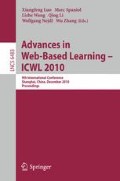Abstract
Hybrid Learning is becoming one of important applications by integrating e-learning and traditional face-to-face instruction together. As an introduction to the reader the challenges in hybrid learning of physical education and architecture of Physical Education Hybrid Learning Platform (PEHLP) are firstly provided. The main character of PEHLP is using video instead of textual information as learning material. Then Video Review Module (VRM) is presented. Through the annotation composing functionality of VRM, the teacher can review the student’s actions video, pick out the wrong actions and add still annotations, which for now are either text or specific graphic symbols or audio-recording. And through the annotation viewing/browsing functionality, the student can watch annotated video, find out mistakes and get instructions. In order to control over bandwidths and promote video annotation, the geometry primitives of video annotation graphic symbols are presented in Geometry Primitive Language (GPL) in XML. The experiment shows that the annotation data is 0.37% of the annotation data in JPG format. The user case of this paper shows that 80.9% out of students think that the video review can afford the hybrid learning of physical education, but only 66.7% of them think the hybrid learning instruction mode can attain the same teaching effect in contrasted F2F instruction mode. So we suggest that the proportion of e-learning should be less than 60% in hybrid learning of physical education course.
Access this chapter
Tax calculation will be finalised at checkout
Purchases are for personal use only
Preview
Unable to display preview. Download preview PDF.
References
Pang, Y.J.: Hybrid Learning of Physical Education Using National Elaborate Course Resources. In: Tsang, P., Cheung, S.K.S., Lee, V.S.K., Huang, R. (eds.) ICHL 2010. LNCS, vol. 6248, pp. 270–281. Springer, Heidelberg (2010)
Graham, C.R.: Blended learning systems: Definition, Current Trends, and Future Directions. In: Handbook of blended learning: Global perspectives, local designs, pp. 3–21. Pfeiffer, San Francisco (2005)
Zhao, S.J.: Application of Network Education Technology in Physical Education of Higher Education. Dissertation of South China Normal University (2007) (in Chinese)
China Ministry of Education: The Outline of Eleventh Five-year Plan of National Education Undertaking Development (2006) (in Chinese)
Kim, W.: Towards a Definition and Methodology for Blended Learning. In: International Workshop on Blended Learning 2007 (WBL 2007), pp. 15–17. University of Edinburgh, Scotland (2007)
Tan, C., Liu, Y.: Hybrid Learning and Discussion on its Implementation Measures in Distance Education. Modern Distance Education Research 81(3), 36–38 (2006) (in Chinese)
Qi, Y.: Analysis on Application of Hybrid Teaching Mode in Higher Education. In: Hybrid Learning: A New Frontier, City University of Hong Kong, pp. 151–160 (2008)
Karen, V., Charles D., et al.: Blended Learning Review of Research: An Annotative Bibliography. In: The ALN Conference Workshop on Blended Learning & Higher Education (2005)
Pang, Y.J.: Techniques for Enhancing Hybrid Learning of Physical Education. In: Tsang, P., Cheung, S.K.S., Lee, V.S.K., Huang, R. (eds.) ICHL 2010. LNCS, vol. 6248, pp. 94–105. Springer, Heidelberg (2010)
Carrer, M., Ligresti, L., Ahanger, G., Little, T.D.C.: An annotation engine for supporting video database population. In: Multimedia Tools and Applications, vol. 5, pp. 233–258. Kluwer, Rotterdam (1997)
Davis, J., Huttonlocker, D.: CoNote System Overview (1995), http://www.cs.cornell.edu/home/dph/annotation/annotations.html
Marshall, C.C.: Toward an ecology of hypertext annotation. In: Proceedings of the 1998 International Conference on HyperText, Pittsburgh, PA, pp. 40–48 (1998)
Phelps, T.A., Wilensky, R.: Multivalent annotations. In: Proceedings of the 1st European Conference on Research and Advanced Technology for Digital Libraries, Pisa (1997)
Weber, K., Poon, A.: Marquee: a tool for real-time video logging. In: Proceedings of CHI 1994, Boston, MA, pp. 58–64 (1994)
David, B., Anoop, G., et al.: Annotation for streaming video on the web: system design and usage studies. Computer Networks 31, 1139–1153 (1999)
Author information
Authors and Affiliations
Editor information
Editors and Affiliations
Rights and permissions
Copyright information
© 2010 Springer-Verlag Berlin Heidelberg
About this paper
Cite this paper
Pang, Y. (2010). Improving Hybrid Learning of Physical Education by Video Review. In: Luo, X., Spaniol, M., Wang, L., Li, Q., Nejdl, W., Zhang, W. (eds) Advances in Web-Based Learning – ICWL 2010. ICWL 2010. Lecture Notes in Computer Science, vol 6483. Springer, Berlin, Heidelberg. https://doi.org/10.1007/978-3-642-17407-0_24
Download citation
DOI: https://doi.org/10.1007/978-3-642-17407-0_24
Publisher Name: Springer, Berlin, Heidelberg
Print ISBN: 978-3-642-17406-3
Online ISBN: 978-3-642-17407-0
eBook Packages: Computer ScienceComputer Science (R0)

